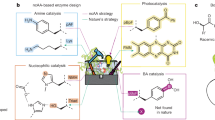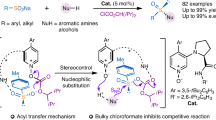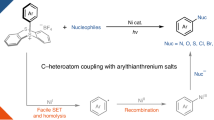Abstract
NON-enzymatic decarboxylation of α-amino-acids was tried many years ago by heating them above 200° C., often dissolved or dispersed in an inert solvent too. As the reactions are always exotherm, heating is only required to reach the rather high energies of activation. The way in which Nature lowers these energies by enzymatic reactions has been frequently discussed. The formation of a Schiff's base between an α-amino-acid and pyridoxal-phosphate as the proved prosthetic group of most of the decarboxylases is postulated by many authors, and the easiness of their decarboxylation may be understood with the help of the electronic theory of valence.
This is a preview of subscription content, access via your institution
Access options
Subscribe to this journal
Receive 51 print issues and online access
$199.00 per year
only $3.90 per issue
Buy this article
- Purchase on Springer Link
- Instant access to full article PDF
Prices may be subject to local taxes which are calculated during checkout
Similar content being viewed by others
References
Curtius, T., and Lederer, G., Ber., 19, 2462 (1886).
Wieland, T., et al., Angew. Chem., 67, 257 (1955).
Author information
Authors and Affiliations
Rights and permissions
About this article
Cite this article
DOSE, K. Catalytic Decarboxylation of α-Amino-Acids. Nature 179, 734–735 (1957). https://doi.org/10.1038/179734b0
Issue Date:
DOI: https://doi.org/10.1038/179734b0
This article is cited by
-
Chemical decarboxylation kinetics and identification of amino acid standards by benchtop NMR spectroscopy
Chemical Papers (2022)
-
Colorimetric determination of carbidopa in anti-Parkinson drugs based on 4-hydroxy-3-methoxybenzaldazine formation by reaction with vanillin
Analytical and Bioanalytical Chemistry (2022)
Comments
By submitting a comment you agree to abide by our Terms and Community Guidelines. If you find something abusive or that does not comply with our terms or guidelines please flag it as inappropriate.



